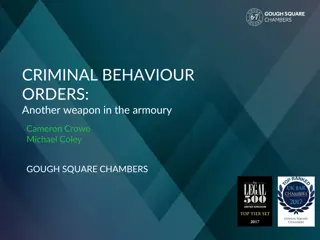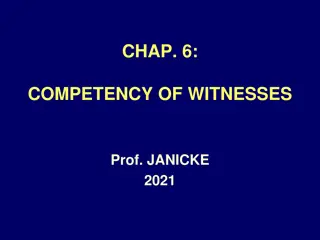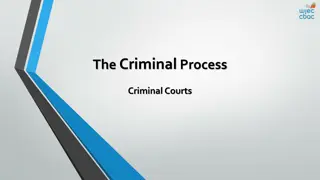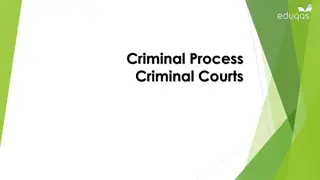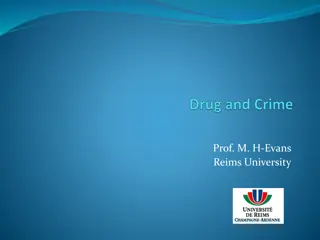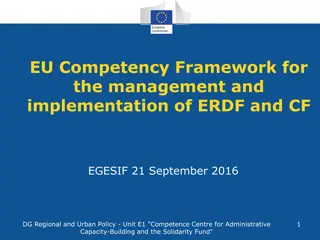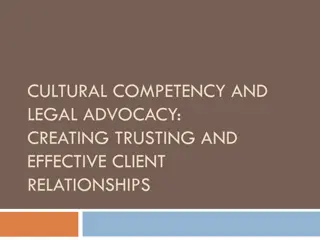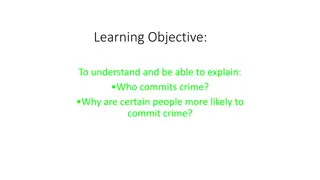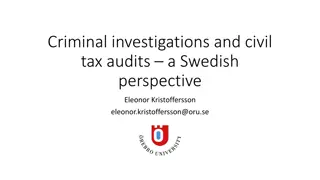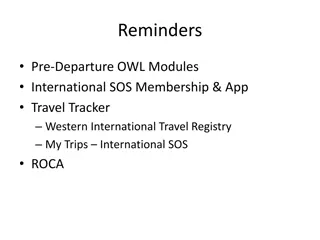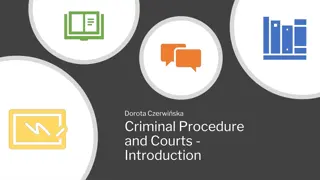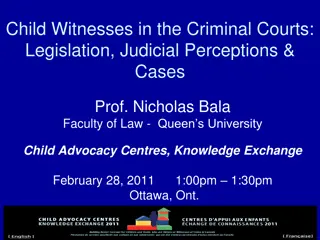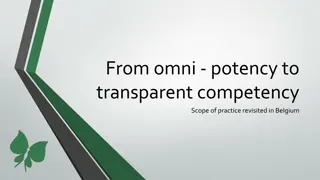Digital Competency Maturity Model 2.0 for Accounting Firms - Overview and Implementation
The Digital Competency Maturity Model 2.0 (DCMM 2.0) is a framework designed to help professional accounting firms evaluate and enhance their digital competencies. Released as an upgrade to the previous version in 2017, DCMM 2.0 offers a structured approach for firms to assess their current level of
4 views • 19 slides
United Nations Survey on Crime Trends and Operations of Criminal Justice Systems
The United Nations Survey on Crime Trends and Operations of Criminal Justice Systems (UN-CTS) focuses on harmonizing data collection, identifying crime patterns, improving monitoring of the criminal justice system, and enhancing international comparability of crime statistics. It was mandated by the
3 views • 18 slides
Understanding Competency-Based Education in Modern Curricula
Explore the differences between new and old curricula, grasp the concept of theoretical versus competency-based education, and delve into the benefits of competency-based learning. Discover how competency-based education shifts the focus from grades to students' competence in subjects.
4 views • 10 slides
Changes in ITC for 2025: Exam Structure, Competency Framework, and More
Exciting changes are coming to the Initial Test of Competence (ITC) in 2025, including adjustments to the exam structure, mark allocation, number of papers, competency framework, and more. The new competency framework emphasizes six competency areas, with a focus on an even spread over three papers.
18 views • 4 slides
Harmonisation of Substantive Criminal Law in the EU
The Treaty of Lisbon serves as a legal foundation for the harmonisation of substantive criminal law within the European Union. It establishes the basis for judicial cooperation, mutual recognition of judgments, and approximation of laws across Member States. The treaty allows for the establishment o
2 views • 60 slides
Understanding Criminal Behavior from a Social Psychological Perspective
This unit delves into the application of social psychology in the legal system, exploring the nature of criminal behavior, responses to criminal acts, the criminal justice system, and rehabilitation. It examines the social ecological perspective of criminal acts and outlines key points related to th
0 views • 50 slides
Understanding Psychological Theories of Criminal Behavior
Psychologically-based criminologists attribute criminal behavior to individual factors such as negative early childhood experiences and inadequate socialization, leading to criminal thinking patterns and incomplete cognitive development. Probation and parole practices are influenced by rehabilitatio
0 views • 30 slides
Competency Evaluation Process: A Comprehensive Overview
This document delves into the process of competency evaluations, specifically focusing on competency restoration and attainment at Utah State Hospital. It covers key steps such as petition, order for evaluation, findings of incompetency, competency restoration treatment, and review. It outlines the
0 views • 41 slides
Understanding Criminal Law and Procedure: Greenvisor's Case
A case study involving embezzlement by Joe Greenvisor, the chief accountant of Nobreath Corporation, sheds light on criminal acts, duties, intent, and societal perspectives on crime. Despite Greenvisor's charitable intentions, his actions constituted a crime under the law. The elements of criminal a
0 views • 47 slides
Understanding Criminal Offences: A Comparative Analysis
Exploring the concept of criminal offences, this article delves into the definitions in common law and continental law systems. It discusses the structural elements, harmful nature, prohibition, punishment, and distinctive aspects of criminal acts. A comparison between common law and continental law
1 views • 33 slides
Understanding Criminal Competency in Legal Proceedings
Competency in criminal cases is crucial for ensuring the accuracy and fairness of legal proceedings. Adjudicative competence, based on standards like the Dusky Standard, relates to a defendant's ability to understand and engage in legal processes. Mistaken beliefs, such as equating clinical disorder
2 views • 12 slides
Understanding the Process of Sealing Criminal Records
Having a criminal record sealed means making it inaccessible to the public while keeping it available to criminal justice agencies. Eligibility for sealing records requires taking action, and not everyone qualifies. This clinic provides guidance on the sealing process and the types of records that c
0 views • 36 slides
Understanding Competency-Based Education in Practice
Competency-Based Education (CBE) allows students to progress based on mastery of skills rather than seat time. It offers personalized learning, efficient outcomes, and focuses on employer needs. Examples include CTE courses, noncredit pathways, and open entry/exit programs. The approach emphasizes c
1 views • 12 slides
Understanding the Roles in Criminal Justice System
The criminal justice system involves three branches of government, each with specific responsibilities, operating at federal, state, and local levels. Law enforcement is primarily a local government function, while legislatures determine criminal laws and punishments. Statutes organized into codes d
0 views • 35 slides
Understanding Substantive Criminal Law in the American Legal System
Substantive criminal law encompasses the definition of criminal acts and penalties, with a core principle being that there can be no crime without a corresponding law. The American legal system follows the Rule of Law, ensuring that all individuals are subject to legal governance. Constitutional lim
0 views • 22 slides
Confiscation in the Criminal Courts: A Guide to Proceeds of Crime Law
Confiscation in the criminal courts involves depriving defendants of benefits gained from criminal conduct within their means. The Proceeds of Crime Law in the Cayman Islands sets guidelines for these proceedings, emphasizing that confiscation is not a form of punishment but aims to recover obtained
3 views • 17 slides
Understanding the Process of Sealing Criminal Records
Sealing criminal records means restricting public access to the records, although they are not destroyed and remain accessible to certain entities. Eligibility requirements vary, and action must be taken to seal records. This presentation covers the process, eligibility criteria, and what to expect
1 views • 36 slides
Comprehensive Training and Competency Program for Mobile Plant and Equipment
This comprehensive program focuses on training, competency, and awareness for mobile plant and equipment within OTML. It emphasizes high standards of safety, health, environment, and competency-based learning to ensure all personnel, including contractors, are appropriately trained. From assessments
0 views • 13 slides
Understanding Civil and Criminal Complaints in Legal Cases
Explore the distinctions between civil and criminal complaints in legal scenarios. Learn how a civil case seeks monetary damages while a criminal case pursues punishment for wrongful actions. Understand the roles of plaintiffs and prosecutors, burden of proof, and outcomes in both civil and criminal
0 views • 34 slides
Briefing on the Criminal Procedure Amendment Bill [B12-2021] to the Portfolio Committee on Justice and Correctional Services
The Criminal Procedure Amendment Bill aims to address the constitutional invalidity of section 154(3) of the Criminal Procedure Act by enhancing protection for child victims, accused, and witnesses in criminal proceedings. The Bill proposes prohibiting the publication of information revealing their
0 views • 12 slides
Enhancing Religious and Cultural Literacy for Effective Engagement
Explore the importance of religious literacy and competency in engaging diverse communities during disasters. Learn how to differentiate between literacy and competency, understand the needs of partners, provide culturally appropriate services, and build sustainable relationships. Continuous learnin
0 views • 20 slides
Understanding Criminal Behaviour Orders: An Overview and Legal Requirements
Criminal Behaviour Orders (CBOs) are issued following conviction for criminal offences to tackle serious and persistent anti-social behavior. This talk provides an overview of CBOs, legal requirements, when they are appropriate, and practical tips for implementation. The orders can prohibit or requi
0 views • 12 slides
Developing Communicative Competence in English Language Teaching
In English language teaching, the main goal of a communicative classroom is to foster students' communicative competence. This includes grammatical competency, sociocultural competency, discourse competency, and strategic competency. By focusing on these aspects, educators aim to enhance students' a
0 views • 7 slides
Witness Competency Guidelines and Rules in Legal Proceedings
Witness competency in court proceedings is crucial for the administration of justice. Modern views and historical practices shape the rules governing witness competency, covering aspects such as firsthand knowledge, oath requirements, refusal to be cross-examined, and handling of hypnotized witnesse
0 views • 31 slides
Administrative Hearing Professionals: Competency and Evidence Considerations
Explore the key aspects of competency objections and evidence considerations in administrative hearings based on a fact scenario involving an employer, a trucking company, and a terminated driver. Learn about witness competency rules, burden of proof, and evaluation of evidence to make informed ruli
0 views • 19 slides
Asset Recovery Practices in England and Wales: Criminal vs. Civil Proceedings
Asset recovery in England and Wales involves a combination of criminal and civil proceedings to secure justice and return funds to victims of crime. The CPS's Proceeds of Crime Division plays a crucial role in obtaining Restraint Orders and Confiscation Orders. Civil recovery, focusing on illicit fi
0 views • 11 slides
Understanding the Criminal Justice System in Court Proceedings
This content explores various aspects of the criminal justice system, including the adversarial system, classification of offenses, criminal court systems, trial procedures, plea bargaining, and more. It covers models of criminal justice systems, classification of offenses, modes of trial, sending f
0 views • 15 slides
Overview of the Criminal Justice System
Exploring the complexities of the criminal justice system, this content delves into the adversarial system, classification of offenses, criminal court system, modes of trial, plea bargaining, trial procedures, and various criminal process models.
0 views • 15 slides
The Statistical Association Between Substance Misuse and Criminal Behavior
This brief synthesis discusses the statistical association between substance misuse (specifically drugs and alcohol) and criminal behavior. It draws upon meta-analyses investigating the links between drug use and crime, as well as alcohol consumption and violent behavior. Various theories are explor
0 views • 12 slides
EU Competency Framework for ERDF/CF Management & Implementation
This EU Competency Framework, developed by DG Regional and Urban Policy, provides a comprehensive approach to assessing competencies for managing and implementing ERDF and CF. It includes self-assessment tools, identifies competency gaps, offers blueprints for training programs, and covers all key i
0 views • 9 slides
Cultural Competency and Legal Advocacy: Building Trusting Client Relationships
Understanding cultural competency is essential in legal advocacy to provide effective and trusting client relationships. Cultural competence involves equal access and non-discriminatory practices, enabling communication and intervention for clients from diverse backgrounds. The importance of cultura
0 views • 18 slides
Exploring the Factors Behind Criminal Behavior
Understanding who commits crime and why certain individuals are more likely to engage in criminal activities involves exploring a range of social and biological factors. While biology suggests a genetic predisposition to criminal behavior, sociology emphasizes the influence of social factors like fa
0 views • 9 slides
Building Change Competency: Keys to Successful Change Management
Discover the importance of building change competency and the keys to successful change management. Explore why change competency is crucial for organizational success, along with strategies for managing change effectively. Learn about different change management approaches and the benefits of a pro
0 views • 25 slides
Understanding the Interaction Between Criminal Investigations and Civil Tax Audits in Sweden
The relationship between criminal investigations and civil tax audits in Sweden is explored, highlighting how tax audits and criminal proceedings run concurrently. The mens rea requirement for criminal sanctions and tax surcharge, as well as the integration between criminal sanctions and tax surchar
0 views • 13 slides
Understanding Intercultural Competency and Cultural Identity
Explore the concept of culture, intercultural competency, and cultural identity through reflections on one's heritage, experiences, values, and beliefs. Learn the importance of developing intercultural competency to communicate effectively across diverse cultures.
0 views • 12 slides
Mastering Competency-Based Interview Questions
Enhance your interview skills by learning how to craft strong responses to competency-based questions using a structured format. Explore tips, strategies, and examples to excel in your next job interview. Utilize tools like Unifrog to prepare and practice for common competency questions effectively.
0 views • 9 slides
Fundamentals of Criminal Law and Procedure
Explore the key aspects of criminal law and procedure, including definitions of crime, the role of criminal procedure, sources of law, phases of the criminal process, participants involved, and rules of evidence in legal proceedings. Gain insight into how criminal law is distinct from civil law and
0 views • 24 slides
Essential Forklift Safety and Competency Guidelines
Comprehensive workplace assessment and competency guidelines for forklift operators, covering essential topics such as forklift safety, driver competency, spotters' roles, barriers and cordons, fitting for purpose considerations, and peer review elements including relevant questions. The guidelines
0 views • 13 slides
Child Witnesses in Criminal Courts: Legislation & Judicial Perceptions
Prof. Nicholas Bala discussed legislation and judicial perceptions regarding child witnesses in the criminal courts, focusing on Bill C-2 amendments, competency inquiries, the Canada Evidence Act, and survey findings on child competency. The presentation highlighted changes in the legal framework to
0 views • 38 slides
Evolving Regulations in Health Professions: A Focus on Competency in Belgium
Belgium has navigated a shift from omnipotency to transparent competency in the regulation of health professions. The laws on health professions and scope of practice have evolved to distinguish between autonomous and non-autonomous professions, emphasizing the importance of competency over traditio
0 views • 20 slides








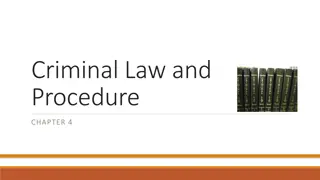
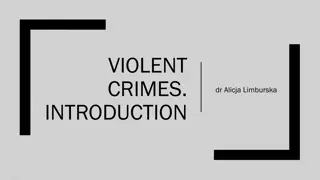
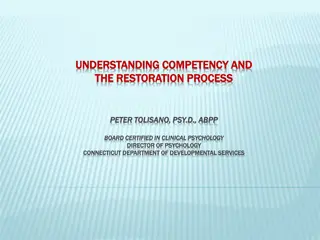

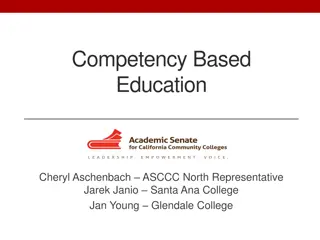
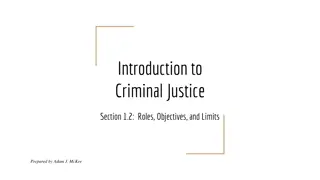
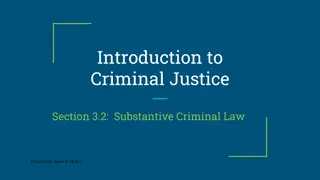
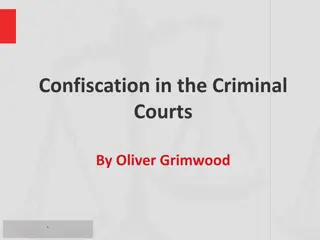

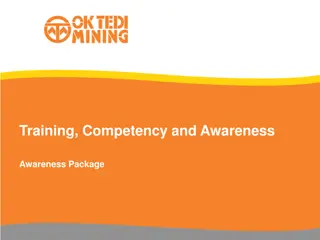

![Briefing on the Criminal Procedure Amendment Bill [B12-2021] to the Portfolio Committee on Justice and Correctional Services](/thumb/157093/briefing-on-the-criminal-procedure-amendment-bill-b12-2021-to-the-portfolio-committee-on-justice-and-correctional-services.jpg)

